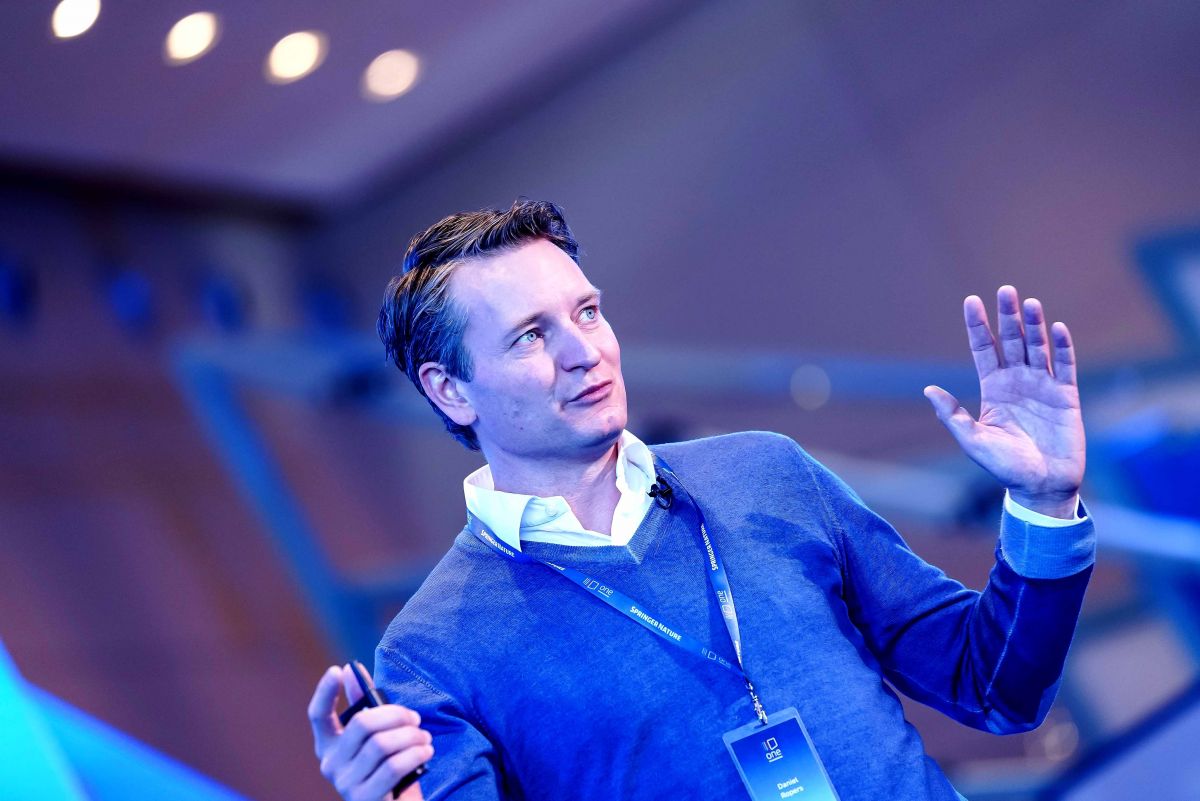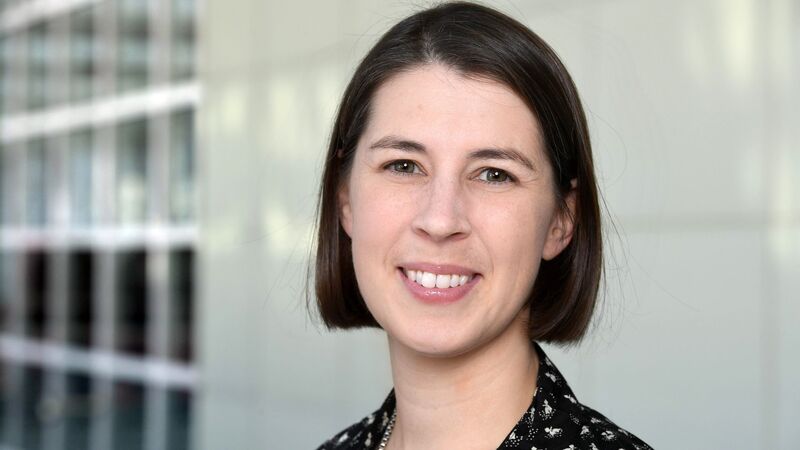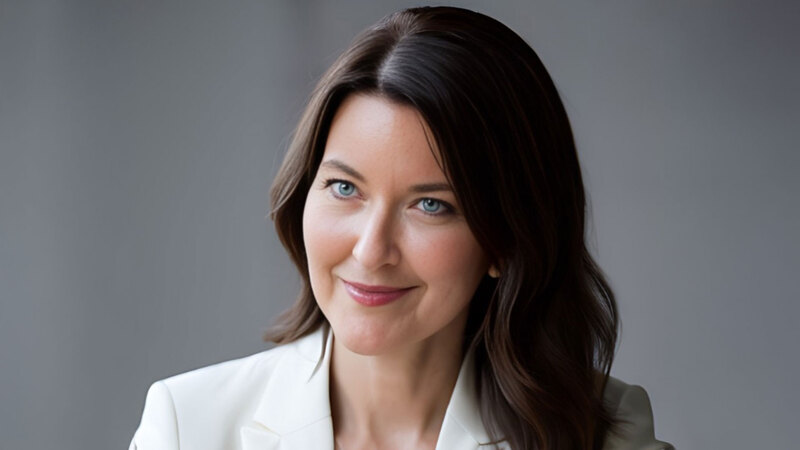You are viewing your 1 free article this month. Login to read more articles.
Daniel Ropers: The outsider’s perspective
The appointment of Daniel Ropers as Springer Nature c.e.o. last autumn—succeeding career publisher Derk Haank, who took the company through the integration period following the merger that created it three years ago—came from left field. Although Ropers is quick to stress that the scholarly science environment is very familiar to him—both parents are scientists, and he grew up on a university campus—he has no background as a publisher.
Instead Ropers has spent the best part of two decades at Dutch online retailer Bol.com, involved as a consultant at its launch in 1998, and acting as its c.e.o. from 2000 onwards. He presided over a period of rapid growth which saw Bol.com establish itself as the largest e-tailer of books, toys and electronics in the Netherlands, generating revenue of €1.6bn in 2016.
Clearly there is the expectation that Ropers will bring that same drive to Springer Nature. Stefan von Holtzbrinck, chairman of the Holtzbrinck Publishing Group which holds a 53% shareholding in Springer Nature, knows Ropers from the early Bol.com days. Started as Bertelsmann Online, the e-tailer was sold to Holtzbrinck, Weltbild and T-Online Venture Funds in 2003, before later changing ownership again.
When he appointed Ropers as c.e.o. of Springer Nature, von Holtzbrinck described him as "well-versed and successful in the digital business world, with B2B and B2C experience—that is key to the future success of all three areas of our business". He added: "This experience is equally relevant to helping researchers to advance discovery by serving up relevant information and making their research globally discoverable, helping teachers make use of digital products to be more effective, or helping professionals to keep up to date with the latest thinking."
Priorities ahead
Energetic and engaging, Ropers gives his reason for making the move from Bol.com: "I was so lucky and privileged at Bol.com. It was a great place with lovely people. It was 20 years of building something that was meaningful to so many consumers and gave us a lot of recognition. But it terms of its purpose [retail], I always thought it was solving a bit of a first-world problem—in Holland, one of the richest countries in the world.
"If I turn to Springer Nature, the world of advancing discovery and learning, I don’t think there are many more important purposes to spend your time and energy on than to support the millions of people who create knowledge and make sure the world has facts to base decisions on, decisions that influence the wellbeing and safety of so many people. What’s not to love, working with something so fundamentally important to the world? And with smart, intelligent, driven people, both the ones we work with and the ones we work for."
Coming fresh into scholarly publishing, what was his first impression? "What struck me most is that it is really not difficult to come up with ideas for things that could be improved; not for me, not for people who have been around for years, not for all the constituencies we work with—authors, and scientists in their roles as reviewers, associate editors or users. I expected there to be a much more stable, much more perfect and mature value chain than in the world of online retail—but I was wrong.
"In my first weeks, everyone—customers, politicians and scientists, people within the company—was taking the opportunity to tell me what I should be doing. I couldn’t fault any of them. I thought, ‘You are all right in your ideas!’ So I thought, ‘If you are all right, if it’s so easy, and there are so many good ideas, why haven’t they all been done?’"
Only three months into the job did the true complexity of the scholarly communications network sink in, he says. "It’s very easy to come up with some ideas that would improve some parts, but the other parts would need to co-operate for [those ideas] to happen. And often, the other parts have nothing to gain and sometimes people have a fundamentally different opinion about what improvement should look like. And, apart from the scientific publishers, there are not a lot of co-ordinating bodies in the world of science; it is hugely fragmented. And that’s why I understand things—even those which everyone agrees are a good thing to do—will probably take a bit longer than on my previous, smaller scale of changing retail in the Netherlands."

Priorities ahead
Asked what his priorities are for Springer Nature, Ropers name checks its established strengths in Open Access and Open Data, with the company "in the sweet spot:
big enough to have impact, but not so big that the prospect of change may mean a risk of losing an already comfortable position."
The company already has positive momentum, he says. "I’m not a turnaround guy. I wouldn’t have joined if it was a company where everyone was negative and disgruntled, I don’t know whether I would have enough stamina. What I’ve found is very positive. And I am confident that to this positivity I bring the experience, skills and self-confidence to help the company aspire to do more to not accept ‘no’ when even more could and should be done."
For a start, Ropers believes Springer Nature can give hundreds of thousands of hours back to the scientific community that are currently being used up in unnecessarily laborious peer review, or the process of getting an article published. Here his Bol.com experience—working with "millions of products, authors, customers, complex many-to-many networks"—can help, he says.
"You can probably save a lot of time and energy, and improve science, by improving the way we select and help find the right article for [the researcher] to read. The network of scientists help each other, they send each other links and information. [But] as scientific publishers with access to all these articles, we also have an obligation and opportunities to recommend ones likely to be relevant—quite like Amazon would do in selecting books—and say, ‘This will interest you.’
“Also, if you think about the peer-review process, it’s at least a craft, and almost an art, as an editor, to select the right peer reviewers. You must have knowledge of their work, know how busy they are—are they swamped right now?—and find a review group that is a fair representation of the subject. I can imagine five, 10 years from now we might use data to be a bit more articulate about why we ask this person to review something, and not that person, and [use data] to ask if we were right to use that person? [We could] be more data-driven about how we make our decisions”.
It would be "a paradox", Ropers says, for one of the prime publishing houses working with scientific material not to work very scientifically itself. "In order to get even better knowledge of how things work, you have to make you sure you have your hands free by automating, becoming more efficient, and by identifying areas that can be replicated and made scaleable via IT and systems. I think bringing in a more fact-based, data-driven approach—getting the intelligence and experience from our 13,000 staff and our network of millions working with us, and insisting on freeing the creativity to reach a new level—is exactly what I did with my old company, and I see a lot of pull from within the organisation to do that here."
Just a few weeks into his new role, Ropers had to contend with a Financial Times report that Springer Nature was the latest global publisher to "bow to China’s censors", highlighting its removal of more than 1,000 articles from the websites of the Journal of Chinese Political Science and International Politics in the Chinese market, containing terms deemed politically sensitive by Chinese authorities (such as "Taiwan", "Tibet" and "Cultural Revolution").
Unlike Cambridge University Press, which last year swiftly reversed a decision to pull selected articles from the China Quarterly at the behest of the Chinese authorities, Springer Nature has held to its position, saying it is "required to take account of the local rules and regulations in the countries in which we distribute our published content".
Censorship concerns
 Sinologists such as Professor Jonathan Sullivan, director of the University of Nottingham’s China Policy Institute, have been angry. "How can we trust the integrity of an academic institution (which is what presses are, whether they are also commercial enterprises or not) if the ultimate arbiter of academic research is outsourced to an unrelated body whose primary criteria is not academic but political?," Sullivan asked in a blog. A thousand academics have signed a petition calling for a peer review boycott of any academic publisher censoring its content in China.
Sinologists such as Professor Jonathan Sullivan, director of the University of Nottingham’s China Policy Institute, have been angry. "How can we trust the integrity of an academic institution (which is what presses are, whether they are also commercial enterprises or not) if the ultimate arbiter of academic research is outsourced to an unrelated body whose primary criteria is not academic but political?," Sullivan asked in a blog. A thousand academics have signed a petition calling for a peer review boycott of any academic publisher censoring its content in China.
A sternness descends on Roper when he addresses the media coverage. "I understand why the term censorship was used. It’s a great term that got everyone’s attention," he says. "Our editorial staff, our peer reviewers, they do everything they can to ensure that the articles that are submitted to us are only judged by the quality and the relevance of the content. There’s no filtering, no influencing, no bias. There’s no bias towards financial motives that we or others might have, or government influence. So I thought that was an unfair term."
He states his position: "We had a terrible dilemma. We didn’t want to give up our core principle that if you operate in a country you have to abide by the law. It would be preposterous to throw that principle overboard. So we only had the choice to withdraw fully from China, or to stay active and allow the distributor to adhere to the local law, which would mean this distributor would not be able to distribute a very small proportion of our digital content. The alternative would have been for us to withdraw all our information from China, which would mean the scientists in China—who give their lives to the advancement of knowledge for the advancement of mankind—would not be able to access any of our content. We would have harmed virtually every Chinese scientist’s ability to produce and contribute to the world.”
But CUP, which faced a comparable dilemma, reversed its decision, seemingly without negative consequences, so why has Springer Nature not followed suit? Ropers says: "If you are a small publisher and not that much into the natural sciences, or not much into China because you are not in parts of science that are core to China, then you don’t have the systems responsibility that big publishing groups have. It’s really hard to imagine [China’s] scientific institutions without the content that is published through Elsevier, Springer Nature, Taylor & Francis and Wiley. With that role comes a responsibility not only to think about what’s a good one-liner [for the press and the general public], or what’s the moral high-ground, but to think about the systems consequences. What seems the good thing to do can be the wrong thing to do."
Springer Nature also grabbed attention in the scholarly world last October with the announcement that it was in "serious talks" on some form of co-operation with ResearchGate, the social networking site where researchers share papers. Controversially, they often do so in breach of copyright. Springer Nature’s announcement, made jointly with ResearchGate, called on other publishers to join the discussions. It came just days after an announcement by a group of publishers terming themselves The Coalition for Responsible Sharing—which includes Elsevier, Wiley and Wolters Kluwer—said that all attempts to work with ResearchGate to find ways for it to run its service in a copyright-compliant way had failed, leaving them no option but to issue millions of takedown notices.
There is no update yet on the progress of the talks, or the response from other publishers, but Ropers is happy to explain his position. "My opinion, coming from an online start-up that has developed in a multibillion-Euro company, is that [that growth] could only have happened because we always took the customers, the users, very, very seriously. And if the customers vote with their feet and say, ‘Actually, I’m missing something, and this is why I’m doing this or that’, then you can’t complain. You have to look at yourself and say, ‘Why haven’t I developed this opportunity, or how can I co-operate with the one that has, so we can both create part of the value and share part of the value?’"
Why, he asks, hasn’t the industry already managed to set up a central clearing-house so that academics who are not able to access their institutional systems because they are at home, or on the road, can still access all the material they are entitled to? "This is something that the industry needs."
"The good thing about these kinds of developments, which sometimes create a lot of negative energy at first, is that people then start to understand what’s going on. There is a divergence, and then sometimes, over time, convergence. It forces you to share opinions, and sometimes from conflict comes insight. I also understand the people who say, ‘I want to take legal action’. There is new energy to solve this issue and that can only benefit everybody."
Going public
Springer Nature hasn’t commented on a recent Reuters report that it is planning to announce its initial public offering (IPO) in May, with a Frankfurt listing scheduled to take place four weeks later, confirming only that "preliminary explorations" are being made. Ropers says: "I don’t think it should come as a surprise to anybody that almost three years into a merger—which was already two or three years after BC Partners acquired Springer, so for [BCP] it is six years or so of being a major shareholder—a private equity house should investigate whether in the next phase there are outside investors more interested in being part of that [investment] than they are. That’s the investigation that’s under way. It’s a big company, so it’s not for everybody to say, ‘OK, I am going to own a big chunk’, so it’s obvious that one of the options is going public. Equally, it might not happen.
"We are very relaxed because no matter what the outcome of the process, we will have a remaining anchor shareholder, Stefan von Holtzbrinck, who has been a wonderful partner over many years. He is super-involved and not just in there for the money; he really likes the fact that we are in a position where we can do good things for the world that are really fun, and [do so] with smart, intelligent people. And [that we are] a good investment because we think we can do many good things going forward for this great industry."














